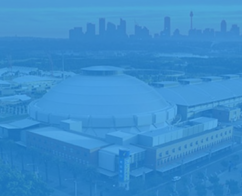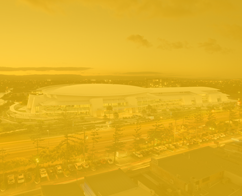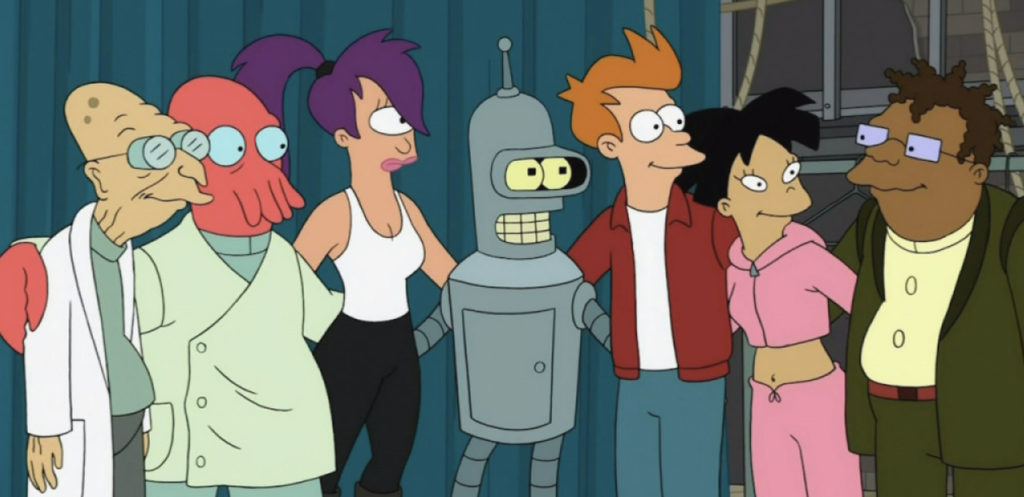
Sydney
June 21-22, 2025
Sydney Showground Olympic Park

Looking at the state of the world, it can sometimes be hard to think about the future in positive terms. But, in 1999, well… things were still pretty bad, actually, but at least we got Futurama out of the whole deal.
If you ask anyone with taste, they’ll tell you (and then tell you again) that Futurama is an incredibly special show. As Matt Groening’s second animated series, it was an eternal underdog that defied network indifference and complaints that it wasn’t The Simpsons, nonetheless going on to become a beloved cult classic that – 20 years after its premiere – remains as smart, funny and poignant as ever.
After the series’ primary protagonist, hapless pizza delivery boy Philip J. Fry (Billy West), is frozen in a cryogenics lab on New Year’s Eve, 1999, he is awoken in the unfathomably distant future of the 31st century. After his abrupt introduction to the sprawling metropolis that is the city of New New York, he realises everyone he’s ever known has long since died, and discovers that his only living relative is a geriatric mad scientist, Professor Hubert Farnsworth (also West), who runs an interstellar courier company called Planet Express. With his newfound friends and crewmates Leela (Katy Segal) – a purple-haired cyclops unsure of her own heritage – and bending robot Bender (John DiMaggio), Fry takes a job for Farnsworth to deliver packages among the stars and find his place in the “WORLD OF TOMORROW!”.
This seemingly simple premise and its futuristic setting prove to be fertile ground for the imaginations of the show’s writers (who included multiple Simpsons alumni) and introduces us to a panoply of colourful characters and concepts that frequently blast past the marginally ridiculous into the flat-out absurd. From space bees and addictive worm juice, to time travel, underground mutants, reincarnation and the concept of Robot Hell, Futurama is a veritable televisual playground of sci-fi scenarios wrapped around a sweet, nougaty core of side-splitting, feel-good nonsense, and it absolutely rules.
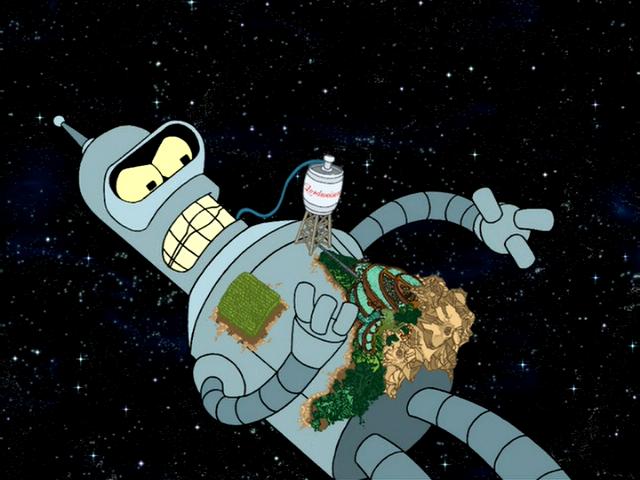 Some people – cynical ones, mostly – would maybe argue that it’s too smart for its own good. More than content to revel in its exceptionally nerdy origins, Dungeons & Dragons, Star Trek, mathematics, science and philosophy all inform fundamental aspects of Futurama’s make-up. For example, one of the most consistently acclaimed episodes from throughout its entire run, Godfellas, tears through the concepts of religion, life and death in a simply superlative 30 minutes, as Bender accidentally gives birth to – and then, equally as inadvertently, destroys – a miniature civilisation on his body while adrift in space. It even leaves us with an eminently quotable piece of advice from God himself (or the remains of a satellite that collided with God; who’s to say?).
Some people – cynical ones, mostly – would maybe argue that it’s too smart for its own good. More than content to revel in its exceptionally nerdy origins, Dungeons & Dragons, Star Trek, mathematics, science and philosophy all inform fundamental aspects of Futurama’s make-up. For example, one of the most consistently acclaimed episodes from throughout its entire run, Godfellas, tears through the concepts of religion, life and death in a simply superlative 30 minutes, as Bender accidentally gives birth to – and then, equally as inadvertently, destroys – a miniature civilisation on his body while adrift in space. It even leaves us with an eminently quotable piece of advice from God himself (or the remains of a satellite that collided with God; who’s to say?).
The show’s underlying intelligence goes further than that, though, as Fry’s presence in the future is eventually revealed to be not accidental, as long assumed, but part of a grand design by an ancient, adorable race of creatures known as Nibblonians, in order for him to act as the saviour of the universe against an invasion of giant brains, thanks to his unique brainwaves. This isn’t just some hastily thrown-together plot twist, either; the shadow of the Nibblonian responsible for his predicament, Nibbler – who usually masquerades as Leela’s pet, despite being one of the most formidably intelligent and long-lived beings in the universe – is actually visible in the pilot when Fry first gets frozen, hiding in plain sight the entire time. It’s a payoff that speaks to the incredible forethought of the show’s creative team, and remains an exceptionally delightful, hard-earned reveal that highlights the impressive amount of work that went into building the world, and universe, of Futurama right from the outset.
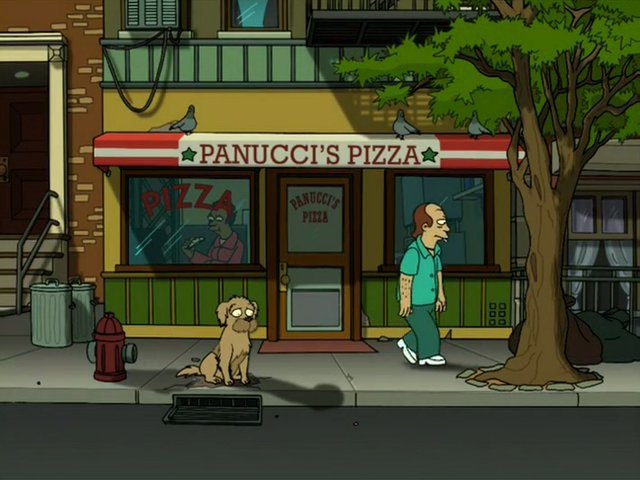 But what truly sets the show apart as an animated comedy is not its head; it’s its heart. While Futurama’s bread and butter is unquestionably its humour and high-jinks, it’s also wholly unafraid to go right for the viewer’s emotions, underpinning the wackier side of things with an indelible sweetness, sincerity and sense of optimism that keeps us coming back time and time again.
But what truly sets the show apart as an animated comedy is not its head; it’s its heart. While Futurama’s bread and butter is unquestionably its humour and high-jinks, it’s also wholly unafraid to go right for the viewer’s emotions, underpinning the wackier side of things with an indelible sweetness, sincerity and sense of optimism that keeps us coming back time and time again.
For example, despite Fry’s initially cheerful response to realising his friends and family are long gone, he is shown, throughout the series, to be truly affected by his sense of loss. There are two episodes in particular – The Luck of the Fryrish and Jurassic Bark – that, to this day, rank among the saddest, most beautifully executed half-hours of TV ever produced. They are absolute masterclasses in lulling the audience into a false sense of levity before blindsiding them with some utterly devastating revelations. The truth of Leela’s parentage – that she is, in fact, not the last surviving member of an alien race but the offspring of mutants who are forced to live in a cloistered, subterranean city because of their physical deformities – is also heart-wrenching, as is the revelation that her parents have nonetheless played a crucial part in her life without her realising. Heck, even Bender gets a tearjerker of an origin tale in season six’s Lethal Inspection.
The relationship between Leela and Fry – he, desperately in love; she, largely uninterested except for the times he contracted intelligence and physique-boosting worms – is also a cornerstone of the series, and the absolute core of Futurama’s emotional heft. Over the series’ initial four season run, and then through its four post-cancellation movies/fifth season and official two-season revival, Fry’s feelings for Leela, and her eventual reciprocation thereof, are explored with a tenderness and sensitivity not often found in your average animated fare. Whether through learning how to play the Holophonor, writing love notes in the stars, or earnestly asking whether girls like swarms of lizards, Fry’s efforts to impress Leela – and, in fairness, Leela’s gestures in kind – are simultaneously responsible for some of the show’s most hilarious and heartfelt moments.
In some ways, Futurama’s cancellation and continually uncertain future thereafter was a blessing in disguise on this front. Rather than having just the one attempt to get its ending right, the show released four instalments that could be considered finales. They didn’t necessarily need four goes at it – after all, their first attempt, The Devil’s Hands Are Idle Playthings, is pretty much perfect as far as series closers go – but, then again, we’re not about to complain.
The multiple finales only reinforce the notion that Fry and Leela are the absolute heart and soul of the series: Into the Wild Green Yonder, the fourth and final of the direct-to-video movies that were later split up into episodic parts to comprise Futurama’s fifth season, ends with Fry and Leela sharing a kiss as the Planet Express ship enters a wormhole to the unknown. Overclockwise, the sixth season’s open-ended finale stand-in – in case the show wasn’t picked up for a seventh – was a little less doe-eyed, putting Fry and Leela through the kinds of troubles that are inevitable in any relationship, but ultimately left things on an encouraging note.
But, if there’s any episode of the series that had to supplant The Devil’s Hands… as the genuine finale, you couldn’t ask for a better successor than season seven’s closer, Meanwhile. Using the classic sci-fi trope of a time loop as its primary plot device, Meanwhile encapsulates everything that makes Futurama the irreplaceable series that it is: it’s wickedly smart, it’s super-funny, and it’s at once both heartbreaking and heartening, as we get to witness Fry and Leela grow old together in a world frozen in time, and thus a world of their own – and then sacrifice those memories to have the chance to do it all again when the Professor eventually comes to their rescue.
Hey, you know what? Maybe the world isn’t so bad in the end. After all, at least we can go back and relive the adventure with them – without forgetting it – as many times as we like, for the next 20 years and beyond.
